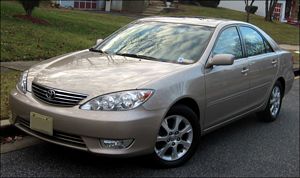|
By accessing or using The Crittenden Automotive Library™/CarsAndRacingStuff.com, you signify your agreement with the Terms of Use on our Legal Information page. Our Privacy Policy is also available there. |

A Voice For Common Sense
|
|---|
|
|
A Voice For Common Sense
Geoff Maxted
DriveWrite
December 18, 2013
DriveWrite has in the recent past complained about the unseemly haste in which car makers seem to be pursuing the dream of the autonomous car. For example, the all-seeing, all knowing Google organisation - who do not make cars - promise to commercialise autonomous driving technology within five years, thus pushing car makers to speed up their research and development.
In contrast, the sensible folk at Toyota wants the human driver to remain the most important decision-maker in the car despite the influx of technology that can take away that responsibility, amidst rising pressure from rivals determined to debut self-driving vehicles by the year 2020.
"We believe that it should be the driver that is at the centre; the driver should take the initiatives," Toyota's managing officer for vehicle control systems, Moritaka Yoshida, recently stated. He went on the say that is Toyota’s conclusion after more than two decades of research on autonomous and automated driving. Not wishing to put words into his mouth it seems that Mr Yoshida can see clearly that it is not all as cut and dried as some would like us to think.
"Think about airplanes," Mr Yoshida continued during an interview on the at the Tokyo auto show last month. "They have an autopilot, but when it comes to important operations, the pilot will always take over and the system will support the pilot's manoeuvres. So the same with the cars, the driver should be at the centre." He further said that Toyota's research in the field will continue at a "very high level," adding that the world's largest car manufacturer would offer automated driving systems but not autonomous driving systems.
Elsewhere, Daimler and Nissan say that by 2020 they will be ready to offer an autonomous car and General Motors says it will offer a self-driving feature that can be toggled on and off, like cruise control; but fully driverless cars will not be a reality "for many years to come," according to Michael Robinson, a GM vice president.
Open questions remain regarding liability if a self-driven car causes an accident that injures or kills the car's occupants or others. Toyota has reason to be concerned about taking responsibility away from the driver. Last month a jury in the U.S. state of Oklahoma awarded two plaintiffs three million dollars in damages in their case against Toyota. Lawyers successfully cast doubt on the safety of the electronic throttle system of a 2005 Camry without specifically proving that it caused the car to accelerate out of control in 2007, killing the driver and injuring a passenger. This is by far not the only case of this type. Toyota have very good reason to be cautious.

















 Topics: Toyota
Topics: Toyota

